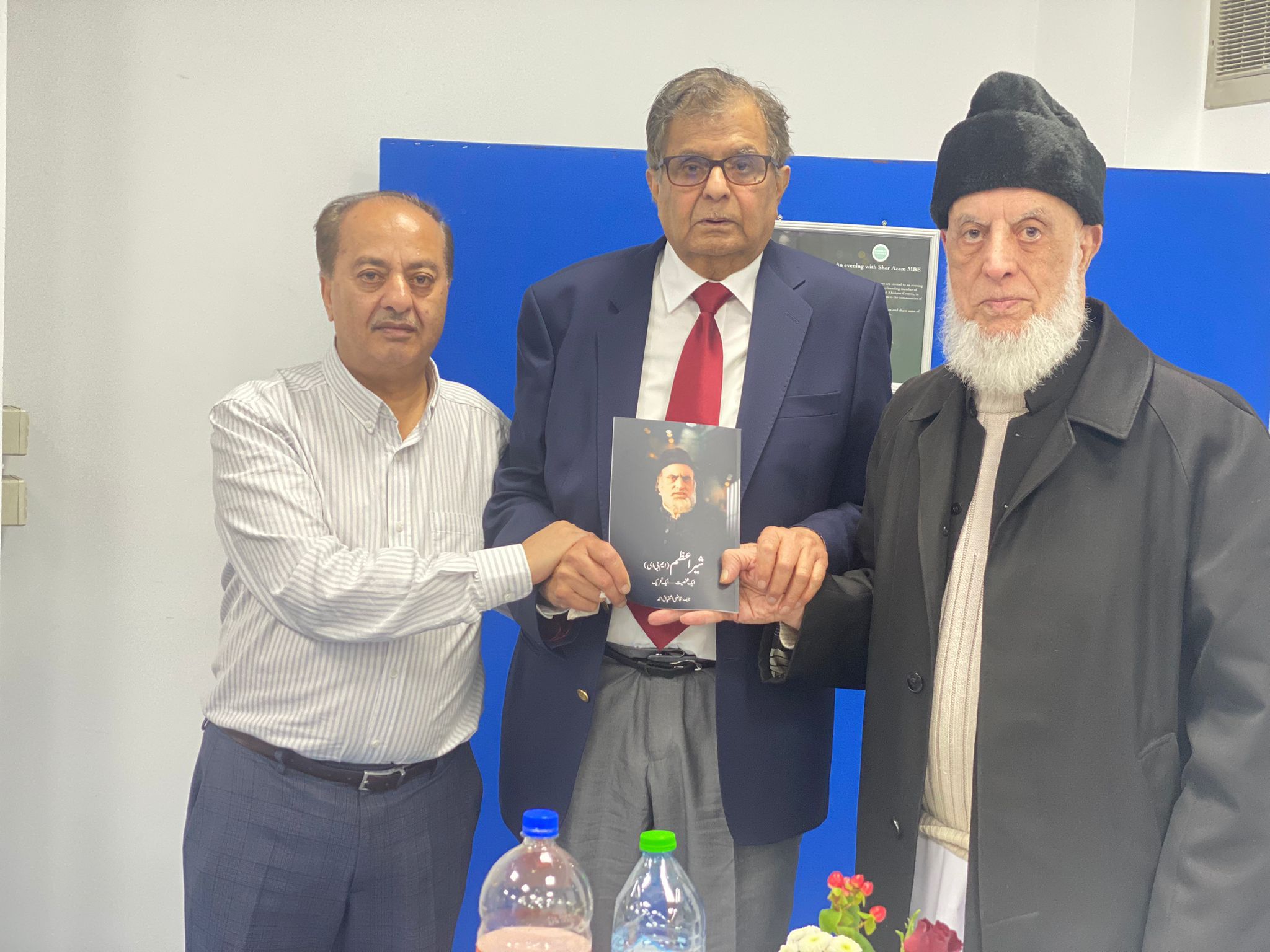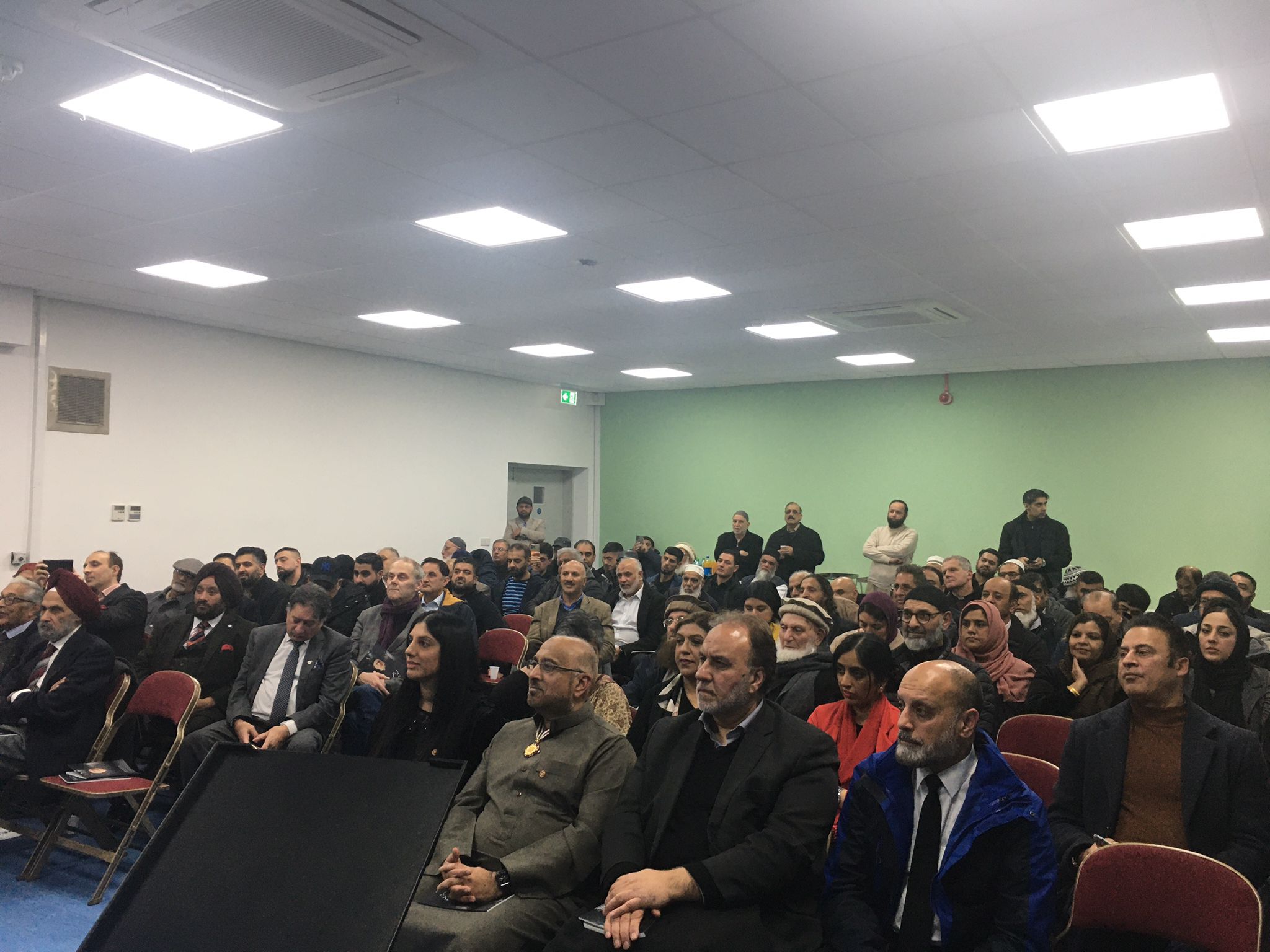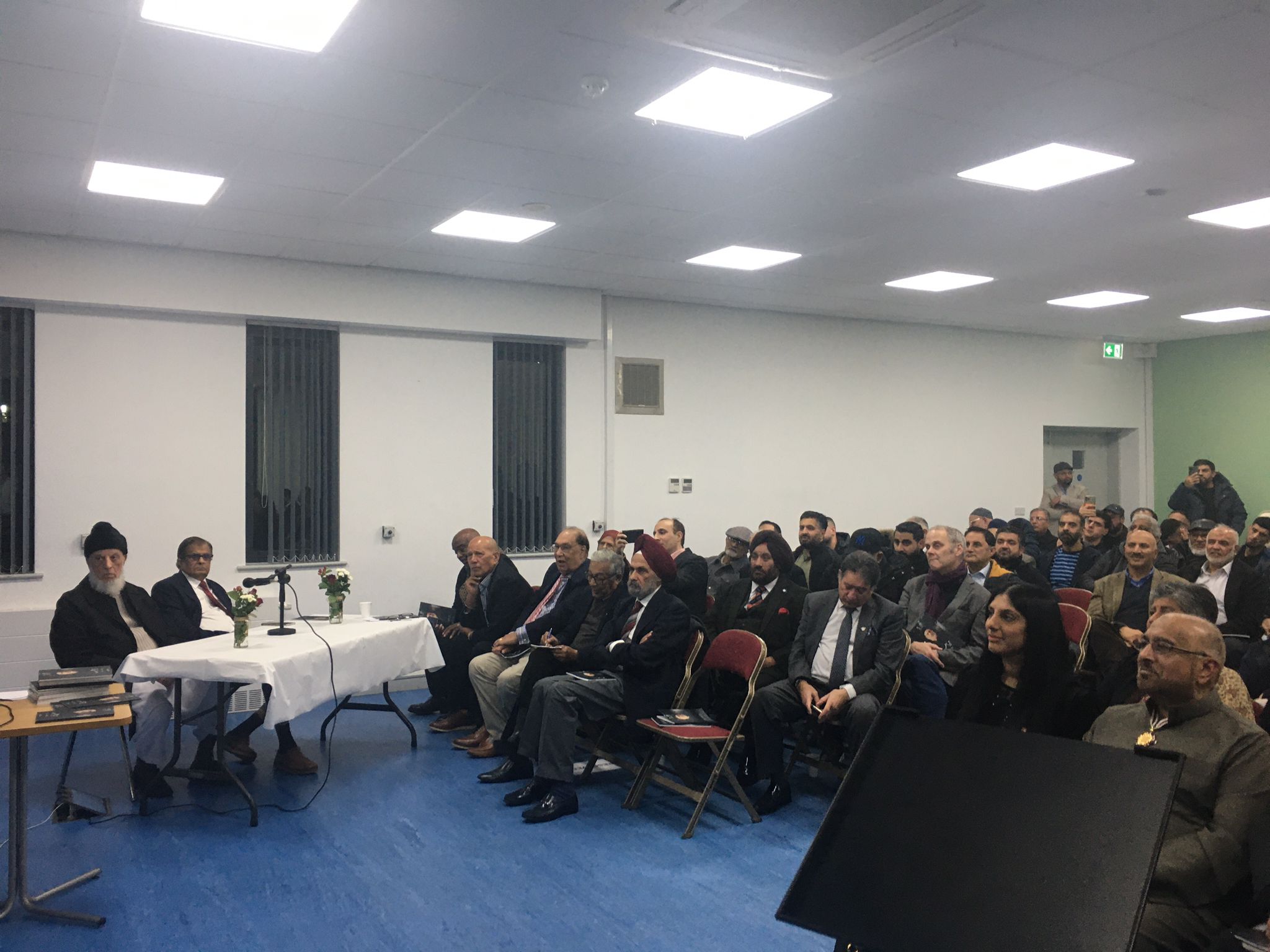A Living Legend Acknowledged
Ishtiaq Ahmed
London: People from all parts of West Yorkshire region and far afield turned up in gratitude to celebrate the life of a living legend that has left an indelible imprint on British society.
A commemorative shield presented by Bradford Council for mosques simply read, “Thank you for making it possible for us to stand on all with dignity in our faith identity”.
The second commemorative shield presented by Khidmat Centres most pertinently read: “Thank you for your vision and leadership”.
These, in different ways, sum up the respect, affection, and regard that people of different faiths, cultures, and ethnicities have for Sher Azam.
The celebration evening was centred around a short book in English or Urdu written by this author to honour and record Sher Azam’s life achievements. His story is not only that of a person but also that of a community, thousands of miles away from the land they still call home. Sher Azam arrived in Bradford from Ghurghushti, a village in the district of Attock, in 1961. His arrival was no different from the wave of workers to the UK in the 1950s and 1960s, at the invitation of the British government.
Sher Azam arrived in Bradford from Ghurghushti, a village in the district of Attock, in 1961. His arrival was no different from the wave of workers to the UK in the 1950s and 1960s, at the invitation of the British government.
Britain’s industrial infrastructure was practically decimated by the Second World War. It had also suffered heavy human losses and required workers to help rebuild its industrial base. It turned to its former colonies.
Men of working age were given an open invitation to come and work in Britain. Pakistan had only recently won its independence, and with limited resources and employment opportunities, it willingly embraced the invitation from Britain. Sher Azam also arrived in Bradford as part of this wave.From there onwards, Sher Azam Journey is nothing short of exceptional.
Bradford, in those days, was regarded as the capital of the textile industry. Within a few days of his arrival, Sher Azam found paid work in a textile mill. After about a year, he joined a local bus company, first as a bus conductor, then progressing on to becoming a driver. Working on the buses required spoken English and arithmetic.
Therefore, only those with some education in Pakistan sought employment with bus companies. This was also uniform employment, which gave the impression that an official service was considered a respectable profession and was the preserve of those with some education from back home. After about two years of working with the bus company, Sher Azam, in partnership with a friend, opened his first grocery shop in 1964.
This was his first step into the world of business, and he was en route to his own textile factory in 1974. He has always been of the view that being employed, no matter how important the role may be, restricts one’s ability to work for the welfare of the community in a free and focused manner. Whereas, business allows a person to utilise his or her abilities with the freedom to proactively impact the welfare of the community. It was this thinking that guided Sher Azam to lay the foundation for the establishment of Halal Super Market in 1985.
Whereas, business allows a person to utilise his or her abilities with the freedom to proactively impact the welfare of the community. It was this thinking that guided Sher Azam to lay the foundation for the establishment of Halal Super Market in 1985.
The aim of this venture was to establish a super market where Muslims would be able to purchase halal products with confidence at relatively affordable prices. It was based on the cooperative investment concept, thus demonstrating that what can’t be accomplished individually could be done collectively.
On his arrival, Sher Azam got involved in the management of the first mosque in Bradford, established in 1958 by workers mainly from the District Attock, becoming its president in 1975, a position that he held until 1985. This enabled him to play a pivotal role in the formation of Bradford Council for Mosques in 1981, a multi-denominational platform of its type in Britain.
This step was necessitated by the emerging needs of the Muslim community, particularly in the area of education. Under his subtle but firm leadership, Bradford CFM successfully accomplished: the provision of halal meat and poultry-based school meals in government schools; the inclusion of Islamic teaching in school religious curriculum; the inclusion of Urdu in the curriculum for the teaching of modern languages, School holidays for Eid; and celebration of other key days such as Pakistan Day, etc. This helps to make the schooling culture more accommodating of the Muslim/Pakistani way of life, infusing confidence and pride in Muslim/Pakistani children. Under Sher Azam’s visionary guidance, Bradford CFM also went on to establish a Muslim cemetery for Muslims to bury their loved ones in according to their faith and dignity. Like Bradford CFM and its aforementioned work, it became a template for other Muslim diasporas in other towns and cities in the UK.
This helps to make the schooling culture more accommodating of the Muslim/Pakistani way of life, infusing confidence and pride in Muslim/Pakistani children. Under Sher Azam’s visionary guidance, Bradford CFM also went on to establish a Muslim cemetery for Muslims to bury their loved ones in according to their faith and dignity. Like Bradford CFM and its aforementioned work, it became a template for other Muslim diasporas in other towns and cities in the UK.
Sher Azam believed that without a strong community-based infrastructure, British Muslims would always be at disadvantage. Using Bradford CFM as a base, he worked tirelessly for the establishment of the Muslim Council of Britain, now one of the premier Muslim national platform in the UK with growing influence in Britain and Europe. Sher Azam also served on the national council of mosques for the UK and Ireland, holding a number of key senior positions.
In 1986, Sher Azam was appointed as a magistrate to the Bradford Magistrates’ bench and, in the same year, awarded MBE in the Queen’s honours list. He was invited twice by HM Prince Charles (the current King Charles III) to The Grove and St. James, then the official residencies of the prince.
Read More:https://thepenpk.com/british-beacon-mosque-awards-shine-light-on-community-impact-amidst-challenges/
Sher Azam also met Prime Minister John Major and Tony Blair but never became a member of any political party, here or in Pakistan, despite being invited, always maintaining that those affiliated with religious institutions and wanting to serve the community should not be affiliated with any political party.
Sher Azam also had the privilege of meeting King Fahad and Prince Abdullah of Saudi Arabia at their palaces, as well as representing British Muslims at the Organisation of Islamic Cooperation (OIC) in Cairo and Ryadh.
This is how a young man from Ghurghushti in Attock, who started his life as a lowly worker in a textile mill, thousands of miles away from the comfort of his family, went on to make an indelible mark in Bradford and in Britain.

Comments are closed.